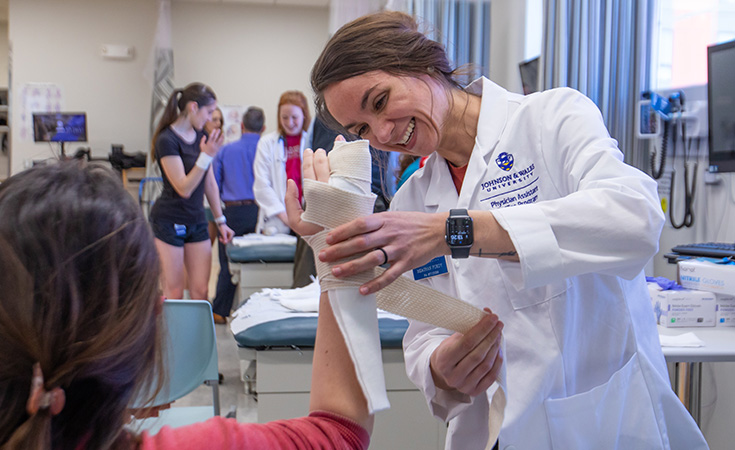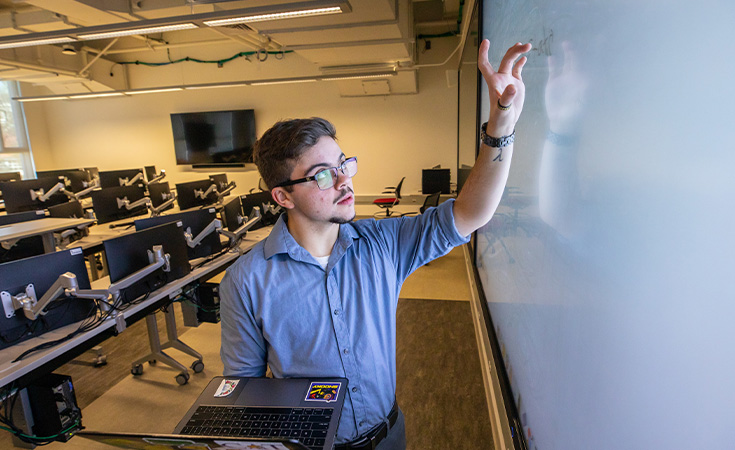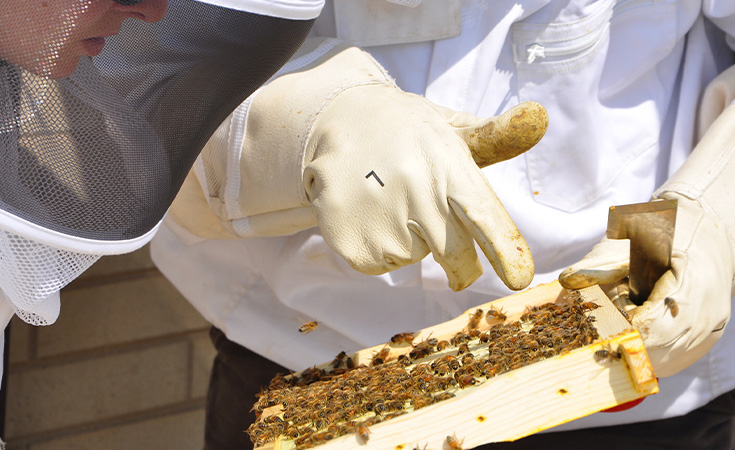JOHNSON & WALES UNIVERSITY’S unique brand of education has represented the best in class since its inception 110 years ago.
Its leaders have a history of forging new paths, first in the realm of business and later in hospitality and culinary arts.
Innovation that meets evolving student needs is the Johnson & Wales way. Since its centennial, the university has offered new health and wellness degrees, created a renowned cybersecurity program, invested in online education, focused on sustainability, and right-sized its physical and academic footprint.
Johnson & Wales is an adaptive institution — it is in our DNA. Here’s how we are leading the way.
Academic Evolution
As the nation questions college affordability and return on investment, JWU is intent on being nimble to ensure that alumni and industry have access to talent pipelines that support success. Credentials such as certificates, badging, accelerated programs and undergrad-uate-to-graduate pathways have been added to save students time and money. The experiential and applied learning model is being reimagined to encompass industry-relevant components in every course — whether through discussions on skills and competencies or real-life problems inside the classroom.
To complement these enhancements, career advisors and faculty mentors will partner to guide students through the process of developing and following a comprehensive career plan. “This approach will provide additional intentional guardrails supporting all students beginning with early career planning and using a building block approach as they progress to graduation,” says Sheri Young, assistant provost for experiential education & industry relations.
Specialized accreditation for programs and colleges and advances in academic standing have also been a university focus. In the past three years, JWU has achieved accreditation from two new agencies, was continued in two others, received a new academic certification, and is making strong progress toward achieving accreditation from six new specialized accrediting agencies. These accreditations are essential as the university pursues excellence in health and wellness education.
Health and Wellness
Why health and wellness? The field is closer to the institution’s roots than you might think. Our half-century as a hospitality and culinary powerhouse has provided the foundation for a patient-centered, empathetic and holistic approach to healthcare education. All students in the College of Health & Wellness (CHW) complete nutrition coursework within a food-as-medicine framework. They employ the tenets of hospitality, from a welcoming bedside manner to clear, direct communication that helps patients better understand their bodies and diagnoses.
Ten years ago, CHW launched its first degree program: the Master of Science in Physician Assistant Studies. Within eight years of its offering, the number of certified physician assistant (PAs) in Rhode Island doubled. JWU’s Occupational Therapy Doctorate (OTD), a full-time, 36-month accredited program, welcomed its first cohort of students in 2019. Both degrees are the first of their kind in Rhode Island and address critical healthcare needs. To combat workforce shortages, the university debuted its accelerated nursing degree program last fall, allowing learners who already have a bachelor’s degree to receive full qualification in just 16 months. The Charlotte Campus began the program in May, while the Providence Campus will premiere a Doctor of Physical Therapy program next summer.
What’s next for CHW beyond these new programs? The college is looking to develop an educational center for current health professionals that focuses on interprofessional team care to ensure patient safety and quality of care. It has also partnered with Harvard Medical School and Brigham & Women’s Hospital to increase the number of individuals from socioeconomic and minoritized groups who enter the healthcare field.
Cybersecurity
CHW isn’t the only college looking to diversify its industry. JWU’s cybersecurity programs feature a range of staff and faculty who are dedicated to supporting students from all backgrounds and experiences — and the National Security Agency and the Department of Homeland Security (NSA/DHS) have noticed. They have designated Johnson & Wales University as a National Center of Academic Excellence in Cyber Defense Education (CAE-CDE). Only 300 colleges had earned this prestigious designation as of its awarding to JWU in 2022. With this stamp of approval, students in the Cyber Intelligence and Defense program enjoy direct access to scholarships, grants, internship opportunities and NSA trainings that are only offered at CAE-CDE institutions.
Students learn how to use various industry-standard cloud services and network equipment to build and secure environments with increasing complexity in JWU’s Cybersecurity Center, a top-tier defense education lab in the heart of downtown Providence. The center provides the Rhode Island community, businesses, law enforcement, and K–12 education institutions access to various cybersecurity services through a Faraday room, an enclosure used to block electromagnetic fields that provides a safe, secure place for professionals and businesses to perform research, test and build applications.
The work is paying off; students are receiving full-time job offers months before graduation and are well-prepared to secure the nation’s online networks.
Online Education
Online networks have allowed JWU to make strides in online education. JWU Online began 10 years ago as a new business model within the university, targeting a new product for a new market: nontraditional adult learners who are not geographically bound to campus locations. By constantly innovating, JWU Online has created a nimble, entrepreneurial community to meet the needs of this growing population.
The college considers what is best for the working adult learner through a comprehensive “students first” model and makes every decision based on accrued data. It built admissions, marketing, student services, and user experiences tailored to the needs of the market. It also created high-quality online classroom experiences to support students’ learning goals.
Going forward, JWU Online will continue to identify student needs and meet each learner where they are in their education journey. Because a growing number of students possess little to no transfer credits, the college is exploring ways to help students accelerate their academic goals and receive credit through prior learning assessments, such as challenge exams, portfolios, and CLEP testing. JWU Online will maintain its focus on customer service and support while expanding its relationships with industry through its corporate partnership program. These efforts are succeeding: JWU Online’s recent Student Voice Score shows that 75% of its students are net promoters of their positive JWU experience.
Sustainability
Another priority is sustainability. Since its formation in 2013, JWU’s Energy Conservation Office (ECO) has spearheaded a broad range of initiatives to create a more sustainable campus and reduce its carbon footprint. To date, the university has
- Offset 100% of campus electricity usage through six remote net metering solar projects in Rhode Island
- Constructed two wind turbines on the Harborside Campus
- Partnered with RI Energy to reduce energy use in facilities and make equipment more efficient and cost-effective — efforts that earned the Providence Campus an Energy Excellence Award from Cenergistic Energy Consultants in 2017
- Grouped class schedules and minimized unused facility space to maximize efficiency of HVAC zones
- Participated in the voluntary City of Providence RePower PVD program, a collaborative, citywide effort to reduce building energy use index by 20 percent by 2025 (JWU’s Academic Center was RePower PVD’s top performer for 2020, reducing energy by 44.6% since 2015.)
- Implemented urban forest management that received the Arbor Day Foundation’s Tree Campus USA recognition
- Partnered with the Green Collaborative, five like-minded student groups who created gardens and maintain two bee hives on campus
- Became the first university in the state to recycle plastic film
- Provided students with reusable tumblers that can be used at filling stations throughout the campus.
- Performed a feasibility study to add solar carports to parking areas
- Encouraged the reuse of items through the “surplus store,” a twice-yearly sale that allows members of the JWU community to purchase lightly used items that are no longer needed.
Sustainable Future
What will that tomorrow look like? As the number of enrollment-aged students has declined, many colleges are struggling to maintain former enrollment numbers and class sizes. JWU, however, has taken steps to ensure that its campus and operations footprint to accommodate a more realistic student population — 10,000, an optimal size that acknowledges market realities. Many schools’ enrollments are down 20% from last year due to issues with the new FAFSA launch. But with JWU’s investments in its future, fall enrollment at the university has increased.
“Moody’s, Standard & Poors, banks that we do business with, accreditors, they all complimented Johnson & Wales. What we are doing is what [other colleges] should be doing,” says Joe Greene, vice chancellor of finance and administration.
Over a decade ago, the university worked to make its $200 million endowment equal its debt. Today, JWU has applied its investment in facilities and retooled its financial model to create a $360 million endowment with debt totaling less than $40 million. This allows the university to invest in its current and new programs, marketing, employees and residential life. As citizens and students compete for housing due to local community shortages, JWU has consulted with city councils and is offering more on-campus housing options from singles to quads at price points that meet a variety of financial needs.
The university has also invested dramatically in dining to align with its reputation around food and student demand. It is preparing food made to order, extending dining hours and creating a robust option that allows more meals per week. The goal is to combat student food insecurity, which affects 23% of undergraduates and 12% of graduate students nationwide according to the National Center for Education Statistics. Overall, these housing and dining options give parents peace of mind that their students can stay and thrive on campus.
Looking to the future, Johnson & Wales is strengthening its academic core and expanding its student services. The university is well-positioned to deliver on its founders’ mission to provide students with an excellent education to reach their fullest potential, whether enrolled in Providence, Charlotte or virtually through the College of Professional Studies. Through the next 110 years and beyond, it remains oneJWU united by its mission and powered by a shared purpose.
“For so many of our students, their JWU education is transformative, filled with promise and poised to release their untapped potential,” says Chancellor Mim L. Runey, LP.D. “We are excited for what the future holds for them and for Johnson & Wales University.”



